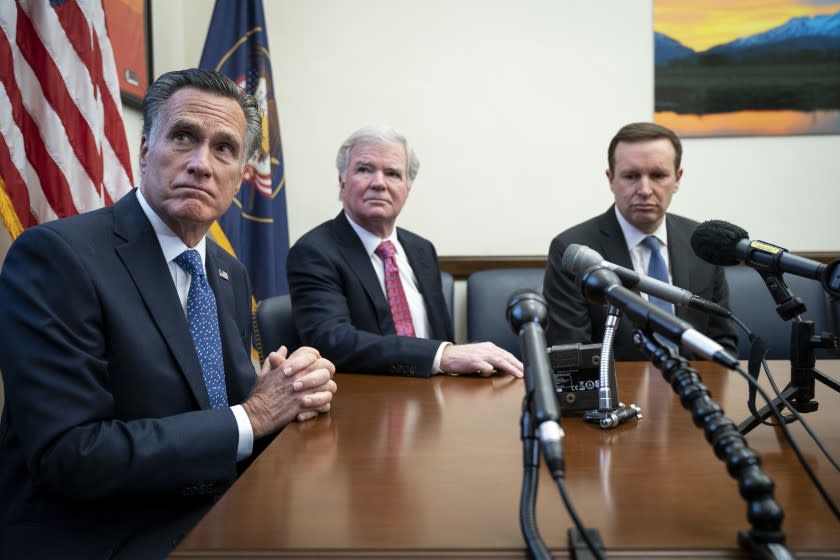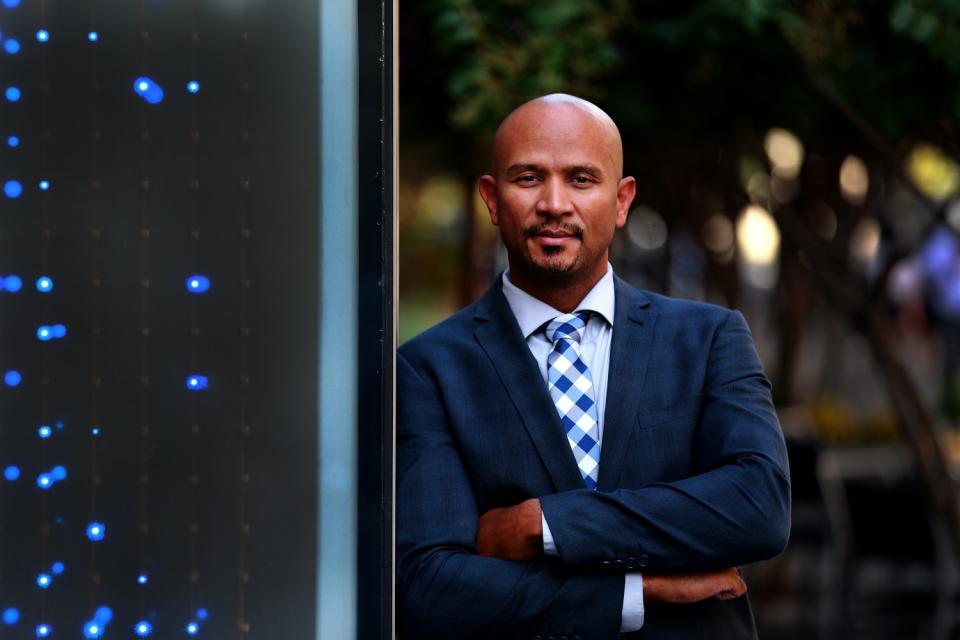Commentary: After Senate flip, Congress won't save NCAA from athlete rights reckoning

Sen. Richard Blumenthal (D-Conn.) was home in Stamford on Friday recovering from what he called a “harrowing” experience Wednesday when a violent mob stormed the Capitol.
The mayhem of that momentous day shifted the nation’s focus from the two U.S. Senate runoff elections in Georgia going to Democrats that turned the Senate blue and adjoined it with a Democratic House of Representatives and White House. Removed from the chaos of Washington, Blumenthal sounded emboldened by the chance to actually govern.
In the midst of so much that is urgent for America, that he took the time to make a phone call to California to discuss the Georgia elections' impact on the future of college sports emphasized the topic’s importance to him.
“This change of leadership is a very big deal for this issue,” said Blumenthal, who has co-authored a player-friendly “College Athlete Bill of Rights” with Sen. Cory Booker (D-N.J.).
“There will be new leadership that will be much more committed to achieving reform concerning college athletics. Name, image and likeness is only one feature of the reform that’s necessary.”
That last part has to be chilling for the NCAA and its schools, which have responded to dozens of states — led by California — introducing legislation to allow college athletes to profit from the use of their name, image and likeness (NIL) by going to Congress looking for a one-size-fits-all federal solution that would supersede a mix of state laws, preferably in a way that helps the schools keep the entire financial pie and includes safeguards that protect the association against further antitrust litigation.
The NCAA’s president, Mark Emmert, and Board of Governors took an educated risk in bringing their problems to Washington, but their calculations had to have assumed Republicans would at least maintain control over the Senate.
Sens. Marco Rubio (R-Fla.) and Roger Wicker (R-Miss.) have already introduced bills that take a more restrictive tone than the NCAA’s own proposal for NIL. The Republican-authored bills do not address the rest of college sports’ glaring inequities.
Now those bills will have trouble picking up steam, and the College Athlete Bill of Rights — which aims to guarantee athletes medical care beyond graduation, lifetime scholarships to complete their education and a 50% revenue sharing requirement for programs that make a profit — will be pushed hard by the Democratic caucus.
The NCAA can’t repeal its request for a federal fix. Congress is firmly invested, just not in the way the association wants it to be.
“Their move absolutely backfired,” said Ramogi Huma, executive director of the National College Players Assn. and a former UCLA football player. “The NCAA and conferences are not serious about real reform, and they tried to pull the wool over Congress’ eyes. … This gives us a great foothold to make sure these issues never go away until they are addressed. Ideally, it would be broad-based reform.”

The NCAA's proposal for an NIL rule change as currently written would allow players the ability to profit from third-party endorsement deals and sponsorships, autograph signings and their participation in camps, but with numerous restrictions meant to keep the recruiting environment pure, as if it ever has been.
It feels like a gargantuan step for the NCAA to have gotten that far, even if it has only done so because of the pressure of state legislatures and a public that has grown weary of the hypocrisy of a system that generates upward of $15 billion annually but limits the earning of the young people who play the games.
The NCAA had scheduled its Division I Council to vote on the revised NIL rules Monday at the start of the association's annual convention. Given the congressional uncertainty, it was no surprise Thursday when Sports Business Journal reported college sports administrators were considering delaying the NIL vote. Multiple outlets have since reported that the vote will not happen this week.
“The political ground shifted dramatically on Tuesday," said Tom McMillen, the president of Lead1, an organization that supports the interests of college athletic directors and a former U.S. representative from Maryland.
"I think if the Republicans had controlled the Senate, it would have been a [bipartisan] compromise that would have probably been more close to where the NCAA is. Now that the Democrats won control, the Republicans will be more marginalized on this issue. That means it’s going to be a more expansive bill. From the NCAA perspective, I’m sure they’re trying to read the political winds. If they come out with their proposal, they want to make sure that it has a fighting chance.”
It’s logical that the NCAA would not want to vote on a proposal in January only to have Congress squash it with its bill. A delay in the NCAA vote would also buy it time to see how the Supreme Court rules in the association’s appeal this spring of Alston vs. NCAA, which ruled that the NCAA’s restriction on education-related benefits for college athletes was a violation of antitrust law.
Whether or not it is lawful for schools to cap their “cost of attendance” stipends is a separate issue from NIL and what is included in the College Athlete Bill of Rights, although the ideal of amateurism is at the heart of everything.
Blumenthal said the Supreme Court ruling should not have any bearing on Congress, but McMillen thinks the court could “set the table.”
Blumenthal said he wants to reintroduce college sports reform in the first legislative session, in late January or February. He will have the power to do so, as he will assume the chairmanship of the Consumer Protection Subcommittee within the Senate's Commerce Committee. Blumenthal and Booker are both on the Senate Judiciary Committee, which will have jurisdiction.
All committee chairs will soon be Democrats, and at Senate hearings the majority party has more control over who is invited to be a witness. Expect a current college athlete to testify for the first time this spring, in the teeth of a pandemic that has further exposed an exploitative system.
“It’s emphasized the sacrifices that athletes make and the costs of them playing sports,” Blumenthal said. “They played even when their schools were closed, and one indication of the need for reform came at the beginning of the season when they were asked to sign waivers by some schools that they would not hold the school responsible if they got sick.”
The NCAA still has plenty of time to act before Florida’s NIL law goes into effect July 1. The association can change its rules whenever it wants. The problem is that the schools hoped Congress would do the work for them. That prospect from this point forward is rightfully unnerving.
This story originally appeared in Los Angeles Times.

